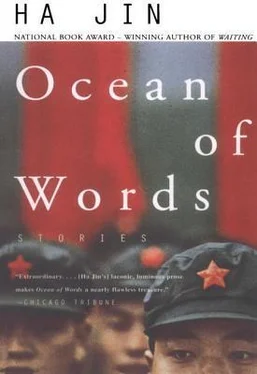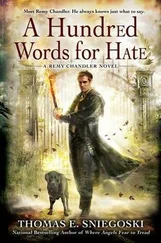But his euphoria lasted only a few hours. The dinner was a sample of the present sweetness, so there was plenty of good food — fried pork, bean sprouts with scrambled eggs, noodles, and stewed pollack. Because we hadn’t eaten lunch, the spacious dining room instantly turned into a battlefield. The major fight was waged around two huge field caldrons containing noodles. Waves of men, bowls and chopsticks in hands, charged, plundered as much as possible, then withdrew with filled bowls to the dining tables. I pushed forward, waving my chopsticks in the air fearful of poking somebody’s eyes. When I had almost reached a caldron, Jee emerged from the left flank, panting hard and moving ahead. I bent forward to load my bowl; so did Jee. All of a sudden, noodles splashed on the floor and people dispersed. I stepped back, wiping my face with the back of my hand, and found Jee sitting in the caldron, bareheaded and pop-eyed. God knew how he had got in there.
He scrambled out, his trousers mottled with noodles and cabbage leaves. Without a word he dashed out of the dining room. Squad Leader Lu, putting down his bowl and spoon, followed him immediately. Jee’s fur hat was still floating in the caldron like a drowned chicken. Laughter and cries rang out. Many men went up to the mess to have a better look.
Then Political Instructor Ni arrived and reprimanded us: “Are you revolutionary soldiers or not? Where’s your discipline? You pushed your dear comrade-in-arms into the hot noodles. Where is your proletarian affection? Don’t you feel ashamed? Won’t you suffer from a stomachache, having such noodles inside you?”
Most of us could not eat for a while, because if we had opened our mouths we would have broken into laughter. Song Ang and I put down our bowls and went back to see Jee. Squad Leader Lu was sitting with him in our room, which smelled of soy sauce. Jee, in his underpants, was weeping, his boots and cotton-padded trousers on the radiator; seeing us, he turned his face to the window. Song Ang said, “Don’t take it so hard, Jee Jun. Instructor Ni scolded those men in the dining room.”
“It wasn’t your fault,” I said.
Jee didn’t respond. Unable to do anything, we returned to the dining room to finish dinner and to bring some food back for Jee and our squad leader. In there people talked and smiled while eating. “Miss Jee” was discussed at every table.
Shortly afterwards, another couplet was composed. The little doggerel got two more lines:
Miss Jee, loving noodle soup,
Dived into a caldron in a swoop.
Now he was famous. Soldiers from other platoons would come under any pretext to have a look at him. Most often they would say they came to visit their fellow townsmen. Our squad became the most popular spot in the company. In addition to Jee, Guan was a wonderful storyteller and would entertain the visitors with ancient chivalric legends.
The most difficult course in our training was Russian — I mean for those of us who didn’t know the language. The textbook was not big — only eight pages long and three by four inches. It consisted of fifteen sentences altogether, such as “Hands up!” “Don’t move!” “This is China’s territory!” “Don’t waste your life for the Russian Revisionist Imperialists!” “Down with the New Czar!” “Put down your arms and we’ll spare your lives!” “Follow me!”
Guan and Song had studied Russian in middle school, so those sentences were nothing for them, but the rest of us had to labor day and night to remember every sound in each word. We marked every Russian syllable with a Chinese character and then tried to memorize the characters in a meaningless order. When we shouted out the Russian words on the drill ground, nobody could understand them, let alone obey the orders correctly. Wu once burst into tears, because that afternoon somehow his tongue simply couldn’t work out a Russian sentence and even his Chinese was broken and incomprehensible. In Jee’s words, “it was like having a donkey’s penis in his mouth.” He kept gnashing his gums at us for hours.
Besides our two Russian experts, Guan and Song, Jee did really well. He was probably the best among us, the ignorant ones. Of course he worked on it harder than we did. He could rap out every syllable clearly, though his sentences tended to remain broken. Wu often grabbed him to practice Russian together. Jee’s voice was thin and suave, while Wu’s was thick and hoarse. Whenever the two practiced in the corridor, we would prick up our ears, listening. “No, not like that,” Jee would say. “Don’t mumble. You must shout and let your voice scare them.”
Apparently Jee was pleased with his Russian, though he dared not demonstrate his achievement in the presence of Song and Guan. Song once offered to teach him a few more sentences, but Jee neither accepted nor refused. He merely said, “Let me think about it.”
“Don’t you want to know some truly interesting words?” Guan broke in, winking at Jee.
“I want to know everything about your mother.”
We laughed.
“Miss Jee,” Guan went on, “if you really want to know those words, you must stop being so promiscuous and marry me first. Otherwise how can I make you understand those secret words? Oh, I’m sorry. I forgot you’re not a virgin anymore. Of course you can understand.”
The whole room rang with laughter. Jee remained silent, glaring at Guan with his teeth gritted.
In the final week of the training, we undertook a forced march. This time everything was described to us in advance — the route, the task, and the time were all clear. After dinner, everybody was given two steamed buns for the night. Like most of my comrades, I ate them promptly, believing it better to carry them inside than on my back. Jee didn’t eat his. He was always more calculating than we were.
At eight-thirty we set out south. The snow was deep; the air smelled of birch and pine. Fully equipped, we walked and ran in turn through fields, valleys, hills, woods. Our task was to reach a hill in the Six-Finger Mountain by eleven and surround and wipe out the Russian paratroops.
The wind slacked off while the temperature was dropping. A silver moon swayed in the cloudless sky. Time and again, flocks of crows and pheasants were roused by us, darting away into the dark. A pack of wolves was howling in a distant valley.
It was ten-fifteen and we still had nine li ahead. Our pace was picking up; we moved at the double, which gradually turned to a sprint. “Close up!” Platoon Leader Ding ordered under his breath. We were running desperately. The air was vibrating with the commotion caused by our boots. Somebody’s canteen dropped on the ground and was kicked off, clattering down a cliff. Soon the mountain emerged like a gigantic mushroom in the sky in front of us.
At eleven sharp the bugle blared out and we charged up the hill. Somebody shouted in Russian, “Put down your arms!” Then many kinds of Russian words were echoing in the mountain.
Soon I felt top-heavy, as though the earth was shifting under my feet. Jee was ahead of me, his rifle across his field pack and his hands grabbing branches to pull himself upward. He climbed very slowly.
We were less than a hundred meters from the summit now. Suddenly three red flares pierced the sky, their blazing tails drawing large question marks in the dark space. Below them everything turned pink and distinct for a few seconds. This meant that the enemy was eliminated and that our men had reached the top. I climbed with all my strength and caught up with Jee. He was staggering; he stopped, holding the branches of a juniper with both hands.
“Jee, hurry up,” I said.
He shook his head; his body seemed to reel. Zheng Yuan came up and slapped Jee on the back. “Need help?”
Читать дальше











